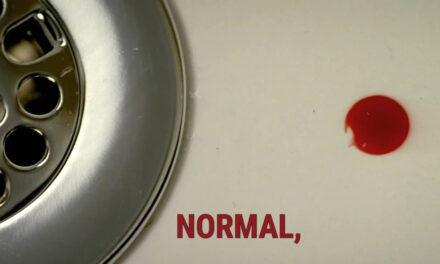In the month before the UK General Election on 7th May, the BFI Mediatheques put together a selection of television programmes which featured elections and voting. We are used to examining how elections are handled on television but unusually this selection included drama and I found myself watching Jack Rosenthal ‘s Mr.Ellis Versus The People from 1974, a year in which there were indeed two general elections. This was a 50 minute stand-alone play directed by June Howson in a Granada series for ITV, Village Hall. Set in a polling station on Election Day, it starred Ron Moody as the Presiding Officer, Mr Ellis, an old hand who has assisted in every election since 1945. He is helped by two younger local government employees – the keen, rule-citing Mr Martin (Brian Martin) and the young, enthusiastic and ready-to-fall in love Miss Robinson (Veronica Roberts). Throughout the long day, the low-tech rituals of the voting process (pencils, paper, lists) are established and the format allows for a range of (now familiar) actors to appear including Bernard Hill as a policeman and Michael Angelis, Richard Griffiths and Marjory Yates as voters. A particular delight is a young Elisabeth Dawn faffing about as the final voter of the day; she began her role as Vera Duckworth in Coronation Streetin the same year.
The play makes fun of the whole process – Mr Martin spouts long-winded and often irrelevant rules, voters mess up their ballot papers and try and get advice on who to vote for from the polling officers, Mr Ellis is conducting a largely long-distance argument with his wife throughout the long 15-hour day. But the play is marked by Rosenthal’s characteristic tolerance of human oddities and is, I felt, underpinned by a basic respect for the voting process. Mr Martin learns that applying the rules rigorously means using some humour and common sense as well and the voters are encouraged to navigate their way through the system; their odd activities while putting a cross on a piece of paper are treated as part of the process not behaviour to be criticised. I was a local government officer myself in 1974 and recognise the ‘structure of feeling’ involved here. I like the way the play both finds the whole process rather bizarre but respects the intentions of those involved.
One feature of the change to fixed term elections is that broadcasters can do some planning for a date which is known years in advance. Channel 4 in particular responded to the run-up to 7th May with a number of dramas which took the election as a theme. First screened, significantly, before the official election campaign started and before more stringent rules about bias applied, was Ukip the First 100 Days. Written and directed by Chris Atkins, this was advertised as a spoof which predicted what might happen if the Ukip manifesto were implemented after a landslide victory (smoking in pubs, raids on immigrants, withdrawal from the EU) and combined archive and fictional material. The play drew a low audience to Channel 4 but generated over 6,000 complaints to Ofcom (which later ruled that it was not in breach of the Broadcasting Code). Although there were some serious issues raised here it lacked the gravitas of a really dystopian television play – perhaps because of the spoof element and perhaps because the play was framed through the point of view of the Ukip candidate and party heroine, Deepa Kaur (Priyanga Burford). This gave us a well-meaning, attractive, BAME Ukip member who in the end spoke out against her party, resolving the story in too neat a way, and perhaps directing attention away from those whose votes would have made this happen.

Just in case we’d forgotten what happened last time, in March, Channel 4 screened Coalition, a dramatisation of the five days after 2010 election when the last government was formed. Publicity made much of the fact that Peter Mandelson, Paddy Ashdown and George Osborne all agreed to be interviewed by the writer James Graham and the result was a rather subdued drama, heavy with hindsight, which didn’t dig very deep about why decisions got made.
,%20Nick%20Clegg%20(Bertie%20Carvel)%20and%20Gordon%20Brown%20(Ian%20Grieve)%20in%20Coalition.jpg)
Unlike Coalition, Ballot Monkeys dealt with the foot soldiers on the election campaign. The five episodes of the Channel 4 comedy stayed with the battle buses of the four main parties; sadly there were no glimpses of behind-the-scenes SNP punch-ups here. The writer-directors Andy Hamilton and Guy Jenkin were able to use this basic structure of the life in the womb of the bus as a solid basis for stories and jokes which could be added in or amended on the day of screening. This did make it up-to-date and there was plenty which seemed both apt and amusing with the Lib Dem campaigner (Ben Miller) sinking into psychotic despair and the bright and breezy US advisor (Kathleen Rose Perkins, fresh from Episodes) popping onto the Labour bus to offer a few incomprehensible platitudes. It was refreshing also to see some stereotypes subverted. The UKIP campaign manager was solidly and sadly sensible as he tried to reason with candidates, helpers and even his bus driver who kept following the party leader off message while the Conservative manager played by Hugh Dennis gets less and less pumped-up as the comments of his intern become more vacuous.

The final drama of the campaign was shown on More4 and took us away from the parties and campaign and back to the ballot box. The Vote, written again by James Graham, was shown in real time, between 8.30pm and 10pm, as the polls across the UK closed. It was broadcast live from the Donmar Theatre and can be deemed a success in that its ratings gave More4 a 2.6% share of audiences, which was apparently up 85% on its average for that time.
Like Mr.Ellis Versus The People, the action all took place in a polling station with Mark Gatiss, Catherine Tate and Nina Sosanya as the election officials. The plot is driven by a mistake in voting procedure which Tate’s polling clerk tries to rectify by further breaches of electoral procedure with predictably disastrous results A huge cast plays the voters who come and go, including the elderly man who votes twice, shrieking school girls in uniform shouting “Siri – who do I vote for?” into a smart phone, a Russian lesbian using a (forbidden) selfie stick and a banker and his haughty wife voting with the ‘hoi polio’ before going off to more pressing social engagements.

Following the success of plays being relayed live to cinemas and the history of theatre plays on television, I thought this could be an interesting experiment. In reality, it was terrible. It was played for farce at a pitch that quickly became monotonous. The always heavy-handed Tate led a host of performers who brought no credibility to their characters and thus invited us just to laugh at them and their idiotic behaviour. Racial, class, age and sexual stereotypes abounded. To her credit Sosanya, recently seen playing comedy so delicately in W1A, looked lost and only Judi Dench, who arrived too late to rescue it, grounded her performance in something other than hysteria. It’s interesting that the theatre critics were full of praise; perhaps Graham and director Josie Wright really hadn’t thought enough about how it would play on television.
I longed for Mr Ellis to come and sort them all out. The point of Rosenthal’s play, of course, was that Mr Ellis wasn’t against the people and that he and they were engaged in the same (mundane but vital) exercise. But if there were a point to The Vote it seemed to be that the electorate were so stupid and the officials so useless that the whole election was a farce. And that would have been okay if they actually intended to make that point and had played the farce with the seriousness and savagery it needed.
And then of course, on 7th May, the voting and The Vote ended. Feeling rather cross, I changed channels to get news of the exit polls . . . .
Christine Geraghty is an Honorary Professorial Fellow at the University of Glasgow. Her publications on television include a contribution to the 1981 BFI monograph on Coronation Street; Women and Soap Opera (Polity, 1991); and My Beautiful Laundrette (I B Taurus, 2004). Her BFI TV Classic on Bleak House was published in 2012 and her reflections on the beginning of her work on soap opera appears in ‘The BFI women and film study group 1976 – ?’, Renewing Feminisms, Radical Narratives, Fantasies and Futures in Media Studies H. Thornham and E. Weissmann (eds) I B Taurus 2013. She is on the editorial board of the Journal of British Cinema and Television and sits on the advisory boards of a number of journals, including Screen.





